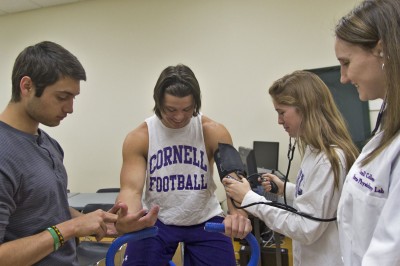By Jacob Luplow ’16
Not many will become the next Allyson Felix or Russell Wilson, but that does not mean every sports enthusiast has to relinquish their love for athletics as they move into the “real world.” At Cornell, the kinesiology major is highly sought after. It allows students to apply scientific understanding to their interest in sports and exercise, preparing them for a range of health-related careers.

Students taking Professor Meyer’s Physiology of Exercise class during Block 6 examined how the human body works and changes from a resting to an exercising state, gaining hands-on experience through a series of labs to complement their classroom learning. They also looked closely at the roles of personal trainers and physical therapists, familiarizing themselves with the tools and methods common to these fields of study.
Meyer stressed the importance of these fundamentals as being paramount in relation to individual growth and treatment care.
“Understanding the uniqueness of the client’s body, whether you’re a personal trainer, physical therapist, or other, greatly increases the effectiveness of your practice,” she said.
An example of the labs conducted during the course is the bike lab, during which students analyzed the cardiovascular changes occurring during exercise. Meyer explained that one student rides an exercise bike for 20 minutes while other students take blood pressure and heart rate measurements before, during, and after exercise. At the end of the lab, the students then analyze the data they collect, comparing it to what they learned about human anatomy during class lectures.
Alex Latow ’15 said, “The labs in this class are awesome because you can witness how fast the body succumbs to fatigue and also how far you can push your body during exercise.”
Kinesiology majors have a wide variety of careers open to them. Many on this track are interested in physical therapy or other health professions, but additional opportunities include athletic training, sports psychology, nutrition, physical education, and personal training.
“My goal is to go into the field of sports medicine; this class fits in with my future plans by teaching me the effects of physical activity on the body,” said Stephanie Kerbel ’15.
 Students taking Professor Meyer’s Physiology of Exercise class during Block 6 examined how the human body works and changes from a resting to an exercising state, gaining hands-on experience through a series of labs to complement their classroom learning. They also looked closely at the roles of personal trainers and physical therapists, familiarizing themselves with the tools and methods common to these fields of study.
Meyer stressed the importance of these fundamentals as being paramount in relation to individual growth and treatment care.
“Understanding the uniqueness of the client’s body, whether you’re a personal trainer, physical therapist, or other, greatly increases the effectiveness of your practice,” she said.
An example of the labs conducted during the course is the bike lab, during which students analyzed the cardiovascular changes occurring during exercise. Meyer explained that one student rides an exercise bike for 20 minutes while other students take blood pressure and heart rate measurements before, during, and after exercise. At the end of the lab, the students then analyze the data they collect, comparing it to what they learned about human anatomy during class lectures.
Alex Latow ’15 said, “The labs in this class are awesome because you can witness how fast the body succumbs to fatigue and also how far you can push your body during exercise.”
Kinesiology majors have a wide variety of careers open to them. Many on this track are interested in physical therapy or other health professions, but additional opportunities include athletic training, sports psychology, nutrition, physical education, and personal training.
“My goal is to go into the field of sports medicine; this class fits in with my future plans by teaching me the effects of physical activity on the body,” said Stephanie Kerbel ’15.
Students taking Professor Meyer’s Physiology of Exercise class during Block 6 examined how the human body works and changes from a resting to an exercising state, gaining hands-on experience through a series of labs to complement their classroom learning. They also looked closely at the roles of personal trainers and physical therapists, familiarizing themselves with the tools and methods common to these fields of study.
Meyer stressed the importance of these fundamentals as being paramount in relation to individual growth and treatment care.
“Understanding the uniqueness of the client’s body, whether you’re a personal trainer, physical therapist, or other, greatly increases the effectiveness of your practice,” she said.
An example of the labs conducted during the course is the bike lab, during which students analyzed the cardiovascular changes occurring during exercise. Meyer explained that one student rides an exercise bike for 20 minutes while other students take blood pressure and heart rate measurements before, during, and after exercise. At the end of the lab, the students then analyze the data they collect, comparing it to what they learned about human anatomy during class lectures.
Alex Latow ’15 said, “The labs in this class are awesome because you can witness how fast the body succumbs to fatigue and also how far you can push your body during exercise.”
Kinesiology majors have a wide variety of careers open to them. Many on this track are interested in physical therapy or other health professions, but additional opportunities include athletic training, sports psychology, nutrition, physical education, and personal training.
“My goal is to go into the field of sports medicine; this class fits in with my future plans by teaching me the effects of physical activity on the body,” said Stephanie Kerbel ’15.